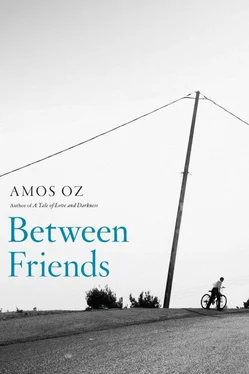Amos Oz - Between Friends
Здесь есть возможность читать онлайн «Amos Oz - Between Friends» весь текст электронной книги совершенно бесплатно (целиком полную версию без сокращений). В некоторых случаях можно слушать аудио, скачать через торрент в формате fb2 и присутствует краткое содержание. Год выпуска: 2013, Издательство: Houghton Mifflin Harcourt, Жанр: Современная проза, на английском языке. Описание произведения, (предисловие) а так же отзывы посетителей доступны на портале библиотеки ЛибКат.
- Название:Between Friends
- Автор:
- Издательство:Houghton Mifflin Harcourt
- Жанр:
- Год:2013
- ISBN:нет данных
- Рейтинг книги:5 / 5. Голосов: 1
-
Избранное:Добавить в избранное
- Отзывы:
-
Ваша оценка:
- 100
- 1
- 2
- 3
- 4
- 5
Between Friends: краткое содержание, описание и аннотация
Предлагаем к чтению аннотацию, описание, краткое содержание или предисловие (зависит от того, что написал сам автор книги «Between Friends»). Если вы не нашли необходимую информацию о книге — напишите в комментариях, мы постараемся отыскать её.
In
, Amos Oz returns to the kibbutz of the late 1950s, the time and place where his writing began. These eight interconnected stories, set in the fictitious Kibbutz Yekhat, draw masterly profiles of idealistic men and women enduring personal hardships in the shadow of one of the greatest collective dreams of the twentieth century.
A devoted father who fails to challenge his daughter’s lover, an old friend, a man his own age; an elderly gardener who carries on his shoulders the sorrows of the world; a woman writing poignant letters to her husband’s mistress — amid this motley group of people, a man named Martin attempts to teach everyone Esperanto.
Each of these stories is a luminous human and literary study; together they offer an eloquent portrait of an idea and of a charged and fascinating epoch. Amos Oz at home. And at his best.
Between Friends — читать онлайн бесплатно полную книгу (весь текст) целиком
Ниже представлен текст книги, разбитый по страницам. Система сохранения места последней прочитанной страницы, позволяет с удобством читать онлайн бесплатно книгу «Between Friends», без необходимости каждый раз заново искать на чём Вы остановились. Поставьте закладку, и сможете в любой момент перейти на страницу, на которой закончили чтение.
Интервал:
Закладка:
“Did you hear? The King of Norway died last night. Cancer. Of the liver.”
Two Women
EARLY IN THE MORNING, before sunrise, the cooing of pigeons in the bushes begins to drift through her open window. The throaty sound, steady and unbroken, soothes her. A light breeze blows across the tops of the pine trees and a cock crows on the slope of the hill. A dog barks in the distance and another one answers it. Those sounds wake Osnat before the alarm clock rings, and she gets out of bed, turns off the alarm, showers, and puts on her work clothes. At five thirty, she leaves for her job in the kibbutz laundry. On the way, she passes Boaz and Ariella’s apartment, which looks locked and dark. They must still be sleeping, she thinks, and that thought stirs neither jealousy nor pain in her, only a vague disbelief: as if everything that happened had not happened to her but to strangers, and not two months ago but many years before. In the laundry, she switches on the electric light because the daylight is still too faint. Then she bends over the waiting piles of laundry and begins to separate white from colored and cotton from synthetic. Sour body odors rise from the dirty clothes, mingling with the smell of soap powder. Osnat works here alone, she keeps her radio on all day to ease the solitude, though the humming of the washing machines muffles both the words and the music. At seven thirty she completes the first round, empties the machines and reloads them, then goes to the dining hall for breakfast. She always walks slowly, as if she’s not sure where she wants to go or doesn’t care. Here, on our kibbutz, Osnat is considered a very quiet woman.
At the beginning of the summer, Boaz tells Osnat he’s been in a relationship with Ariella Barash for eight months and has decided that the three of them cannot go on living a lie. So, he’s made up his mind to leave Osnat and move his things to Ariella’s apartment. “You’re not a little girl anymore,” he says. “You know, Osnat, that things like this happen every day now all over the world, and on our kibbutz, too. Luckily, we don’t have children. It could have been a lot harder for us.” He’ll take his bicycle with him, but leave the radio for her. He wants the separation to be as amicable as their life together has been for all these years. He completely understands if she’s angry with him. Even though she doesn’t really have anything to be angry about: “The relationship with Ariella wasn’t meant to hurt you. Things like this just happen, that’s all.” In any case, he’s sorry. He’ll move his things out right away and leave her not only the radio, but everything else, including the albums, the embroidered pillows, and the coffee set they received as a wedding gift.
Osnat says, “Yes.”
“What do you mean, yes?”
“Go,” she says, “just go.”
Ariella Barash was a tall, slim divorcée with a slender neck, cascading hair, and laughing eyes, one of which had a slight squint. She worked in the chicken coop and was also head of the kibbutz Culture Committee, responsible for organizing holidays, ceremonies, and weddings. In addition, she was in charge of inviting lecturers for Friday nights and ordering movies for Wednesday night showings in the dining hall. She had an old cat and a young dog, almost a puppy, which lived together peaceably in her apartment. The dog was frightened of the cat and would politely give it a wide berth. The old cat would ignore the dog and walk past as if it were invisible. The two of them spent most of the day dozing in Ariella’s apartment, the cat on the sofa and the dog on the rug, indifferent to one another.
Ariella had been married for a year to a career army officer, Ephraim, who left her for a young woman soldier. Her relationship with Boaz began when he came to her apartment one day wearing a sweaty work singlet stained with machine oil. She’d asked him to drop by to fix a dripping tap. He had on a leather belt with a metal buckle. As he bent over the tap, she stroked his sunburned back gently several times until he turned around without putting down his screwdriver and wrench. Since then he’d been sneaking into her apartment for half an hour here or an hour there, but there were those on Kibbutz Yekhat who noticed the sneaking around and did not keep that discovery to themselves. People on our kibbutz said, “What a strange pair; he hardly says a word and she never shuts up.” Roni Shindlin, the comedian, said, “The honey is eating the bear.” No one told Osnat about it, but her friends showered her with affection and found ways to remind her that she wasn’t alone, if she needed anything, the slightest thing, and so on and so forth.
Then Boaz loaded his clothes into his bicycle basket and moved to Ariella’s apartment. He’d come back in the afternoon from his job in the garage, take off his work clothes, and go into the bathroom for his shower. From the doorway, he’d always say to her, “So, anything happen today?” And Ariella would reply in surprise: “What should’ve happened? Nothing happened. Take your shower and we’ll have coffee.”
In her mailbox, which was on the far left side of the mailbox cabinet near the entrance to the dining hall, Ariella found a folded note in Osnat’s round, unhurried handwriting:
Boaz always forgets to take his blood pressure pills. He needs to take them in the morning and at night before bed, and in the morning he has to take half a cholesterol pill. He shouldn’t put black pepper or a lot of salt on his salads, and he should eat low-fat cheese and no steak. He’s allowed fish and chicken, but not strongly spiced. And he shouldn’t gorge himself on sweets. Osnat.
P.S. He should drink less black coffee.
Ariella Barash wrote a reply to Osnat in her sharply angled, nervous handwriting and put it in her mailbox:
Thank you. It was very decent of you to write to me. Boaz also has heartburn, but he says it’s nothing. I’ll try to do everything you ask, but he’s not easy and he couldn’t care less about his health. He couldn’t care less about lots of things. You know. Ariella B.
Osnat wrote:
If you don’t let him eat fried, sour, or spicy foods, he won’t have heartburn. Osnat.
Ariella Barash replied several days later:
I often ask myself, what did we do? He suppresses his feelings and mine keep changing. He tolerates my dog but can’t stand the cat. When he comes home from the garage in the afternoon, he asks me, So what happened today? Then he takes a shower, drinks some black coffee, and sits down in my armchair to read the papers. When I tried giving him tea instead of coffee, he got angry and grumbled that I should stop trying to be his mother. Then he dozes in the chair, the papers fall on the floor, and he wakes up at seven to listen to the news on the radio. He pets the dog while he listens, mumbling some indistinct words of endearment. But if the cat should jump onto his lap asking for affection, he heaves him off with such disgust that I cringe. When I asked him to fix a stuck drawer, he not only fixed the drawer, but he also took apart and reassembled two wardrobe doors that squeaked, and asked with a laugh if he should fix the floor or the roof too. I ask myself what it was about him that attracted me and sometimes still does, but I have no clear answer. Even after his shower, his nails are black with machine oil and his hands rough and scratched. And after he shaves, there’s still stubble on his chin. Maybe it’s that constant dozing of his — even when he’s awake he seems to be dozing — that tempts me to try and wake him. But I manage to wake him up for only a short while, you know how, and that doesn’t always happen either. Not a day goes by when I don’t think about you, Osnat, and despise myself and wonder if there can be any forgiveness for what I did to you. Sometimes I tell myself that maybe Osnat didn’t really care so much, maybe she didn’t love him? It’s hard to know. You might think that I actually chose to do that to you. But we don’t really have a choice. This whole business of attraction between a man and a woman seems suddenly strange and even a bit ridiculous. Do you think so too? If you had children, you and I would have suffered a lot more. And what about him? What does he actually feel? How can anybody tell? You know so well what he should and shouldn’t eat. But do you know what he feels? Or whether he feels at all? I once asked him if he has any regrets and he said, “Look, you can see for yourself that I’m here with you and not with her.” I want you to know, Osnat, that almost every night after he falls asleep, I lie awake in bed and look at the moonlight coming into our dark bedroom through the crack in the curtains and ask myself what would’ve happened if I’d been you. I’m drawn to your stillness. If only I could absorb some of that stillness. Sometimes I get up and dress and walk to the door, thinking that I’ll go to you in the middle of the night and explain it all, but what can I explain? I stand on the porch for ten minutes, look up at the clear night sky, locate the Plough, then get undressed again and go back to lying awake in bed. He’s snoring peacefully and I feel a sudden longing to be somewhere else entirely. Maybe even in your room with you. But please understand, this only happens to me at night when I’m lying awake and can’t fall asleep and don’t understand what happened or why, and I just feel such an intense closeness to you. I’d like to work in the laundry with you, for example. Just the two of us. I always carry both your short notes in my pocket and take them out to read over and over again. I want you to know how much I value every word you wrote and also, even more, how impressed I am by what you didn’t write. People on the kibbutz talk about us. They’re surprised at Boaz; they say that I just walked past, leaned down, and plucked him away from you and that he, Boaz, couldn’t care less about which apartment he goes to after work or which bed he sleeps in. Roni Shindlin winked at me near the office one day, grinned, and said, So, Mona Lisa, still waters run deep, eh? I didn’t answer him and walked away in shame. Later, at home, I cried. Sometimes at night I cry, after he falls asleep, not because of him or not only because of him, but because of me and because of you. As if something bad and ugly happened to both of us that can’t be fixed. Sometimes I ask him: What, Boaz? And he says: Nothing. I’m attracted to that blankness — as if he has nothing, as if he came straight from a desert of solitude. And then — but why am I telling you this? After all, it hurts you to hear it and I don’t want to add to your pain. Just the opposite; I want to share your loneliness the way I wanted to touch his for a moment. It’s almost one in the morning now, he’s asleep, curled up in fetal position, the dog at his feet, and the cat is lying here on the table, his yellow eyes following the movement of my hand as I keep writing and writing by the light of a gooseneck lamp. I know it’s pointless, that I have to stop writing, that you won’t even read this note, which has stretched to four pages. You’ll probably tear it up and throw it away. Maybe you’ll think I’ve lost my mind, and I really have. Let’s meet and talk? Not about Boaz’s diet or the medicine he needs to take. (I really do try not to let him forget. I try, but don’t always succeed. You know that stubbornness of his, which seems like disdain but is more like indifference.) We could talk about totally different things. Like the seasons of the year, for example, or even the star-filled sky of these summer nights: I’m interested in stars and nebulas. Maybe you are too? I’m waiting for you to write a note telling me what you think, Osnat. Two words will do. I’m waiting. Ariella B.
Читать дальшеИнтервал:
Закладка:
Похожие книги на «Between Friends»
Представляем Вашему вниманию похожие книги на «Between Friends» списком для выбора. Мы отобрали схожую по названию и смыслу литературу в надежде предоставить читателям больше вариантов отыскать новые, интересные, ещё непрочитанные произведения.
Обсуждение, отзывы о книге «Between Friends» и просто собственные мнения читателей. Оставьте ваши комментарии, напишите, что Вы думаете о произведении, его смысле или главных героях. Укажите что конкретно понравилось, а что нет, и почему Вы так считаете.












